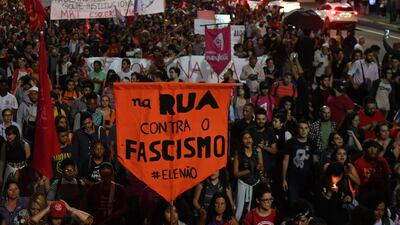The far-right frontrunner to be Brazil’s next president, Jair Bolsonaro, stumbled on Wednesday by spooking previously supportive investors, while a spate of violent incidents pointed to deep polarisation caused by the election race.
The Brazilian stock market fell, pulled lower by steep plunges in state-run energy companies, after Mr Bolsonaro made clear his promises for privatisations and pension reform were a lot less ambitious than many expected.
Mr Bolsonaro’s economic advisor was also targeted in a federal fraud probe into alleged mismanagement in investment firms he ran, involving pension funds linked to state-run companies. The prosecutors’ office confirmed the investigation, first reported by the Folha de Sao Paulo newspaper, to AFP.
________________
Read more:
Corruption in Brazil has allowed Bolsonaro to thrive
Brazil election: Jair Bolsonaro wins first round
Brazilian women rally in force against presidential frontrunner Jair Bolsonaro
_______________
Sensing an opportunity, trailing leftist candidate Fernando Haddad pressed for televised debates against Mr Bolsonaro ahead of an October 28 run-off to decide the presidency.
It was unclear, however, what impact the developments would have on Mr Bolsonaro’s substantial lead going into that election.
The populist ultra-conservative won 46 percent of the vote in a first round held last Sunday, despite detractors highlighting his contentious past comments demeaning women and gays, and speaking in favour of torture and Brazil’s 1964-1985 military dictatorship.
Mr Haddad, representing the Workers Party despised by Bolsonaro supporters for its 2003-2016 years in power when Brazil went through a boom then devastating bust, scored 29 percent.
A survey released late Wednesday by the Datafolha firm confirmed Mr Bolsonaro’s advantage for the second round, crediting him with 58 percent of voter intentions to 42 percent for Mr Haddad.
Mr Bolsonaro sent a chill through investors who last week had sent Brazilian markets soaring on his vow to implement free-market reforms to Latin America’s biggest economy, long run on a protectionist, statist model.
In an interview Tuesday with Band TV he said his privatisation pledge would not extend to the core business of oil company Petrobras or electricity generation activities. He pointed to China – which has become Brazil’s top foreign investor and trade partner – as a threat.
“China isn’t buying in Brazil – China is buying Brazil,” Mr Bolsonaro said.
He also said that if he got in power he would only “slowly” tackle Brazil’s unsustainable pension system.
Shares in state-run electricity company Eletrobras plummeted 8.4 percent and Petrobras slumped 2.9 percent by the end of trade. The overall Ivobespa stock market index finished almost three percent down, and the Brazilian real fell against the dollar.
Worries that deep divisions in Brazil’s notoriously unequal society were worsening as voters split over the two candidates – both of whom face big blocs of ‘never him’ rejection – hardened with several cases of election-related violence, particularly against Haddad supporters.
A memorial service was held Wednesday for a 63-year-old man stabbed two days earlier in a bar in the northeastern city of Salvador. He was reportedly killed by a 36-year-old man after claiming “the people would prefer the Workers Party” to Mr Bolsonaro.
Elsewhere, Workers Party supporters were said by Brazilian media to have been assaulted and threatened by Bolsonaro backers.
The far-right candidate, a 63-year-old former paratrooper, dismissed the incidents as isolated and sensationalised to “manipulate public opinion.”
“I ask people to stop. But I don’t control them,” he said.
Mr Bolsonaro emphasised the fact that he was stabbed by a lone assailant while campaigning a month ago.
That attack forced him to convalesce at hospital then at home, where he intensified his deft use of social media to attract more voters.
His doctors said he was still not sufficiently recovered to take part in the first debate with Mr Haddad scheduled for Thursday.
Mr Haddad responded that he was willing to debate Mr Bolsonaro anywhere. “I will go to the infirmary if he wants,” he said.
International media have focused on Mr Bolsonaro’s pledges to upend Brazil’s society, politics and economy.
Britain’s Guardian newspaper and The Economist both warned that Mr Bolsonaro represented a dire threat to democracy in his country.
Americas Quarterly predicted bloodshed if Mr Bolsonaro became president. “Brazilian society is in the mood to pound some heads,” wrote long-time Brazil watcher Brian Winter.
But the Wall Street Journal – controlled by Australian-born American magnate Rupert Murdoch, whose media empire strongly backs US president Donald Trump – dismissed the “anxiety attack” over Mr Bolsonaro, “who promises to make Brazil great for the first time.”
The newspaper’s editorial board said it viewed Mr Haddad as wanting to implement a Venezuela-style model. “It’s hardly surprising that Brazilians are responding to a candidate who promises something better,” it said.

